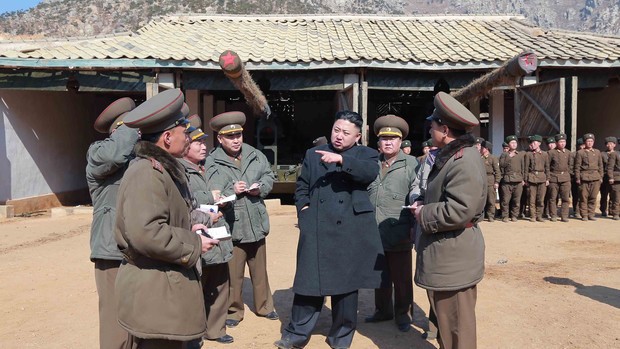 South Korean Defense Minister Kim Kwan Jin announced Thursday that North Korea had moved an unnamed missile system with "considerable" range to its eastern coast, marking Pyongyang's latest provocation as it continues to stoke tensions with South Korea and the West. China, the traditional bulwark against North Korean aggression, has largely been perceived as either unwilling or unable to effectively diminish Pyongyang’s supposed threat, while the United States has maintained an overt retaliatory show of force in response to Pyongyang's latest provocations. Amid the continuing tension, some quiet moves out of India are worth noting.
South Korean Defense Minister Kim Kwan Jin announced Thursday that North Korea had moved an unnamed missile system with "considerable" range to its eastern coast, marking Pyongyang's latest provocation as it continues to stoke tensions with South Korea and the West. China, the traditional bulwark against North Korean aggression, has largely been perceived as either unwilling or unable to effectively diminish Pyongyang’s supposed threat, while the United States has maintained an overt retaliatory show of force in response to Pyongyang's latest provocations. Amid the continuing tension, some quiet moves out of India are worth noting.
North Korean state media outlet KCNA reported Wednesday that Indian Joint Secretary and Head of East Asian Affairs Gautam Bambawale had paid a visit to Pyongyang. Bambawale has a strong relationship with the Indian intelligence community and a reputation in New Delhi for achieving results. India's usually hyperactive media overlooked the trip, but the timing of the visit and the personality involved suggest this was anything but a routine diplomatic visit. Discretion seems to have been a priority, as Bambawale’s travel arrangements did not follow normal protocols and state air carrier Air India was not used. Judging by other events he had scheduled for this week in India and then cancelled, his visit to Pyongyang appears to have been planned within the last week or so. Stratfor has also received indications that Washington may have pushed for Bambawale to visit North Korea, in advance of his April 15 visit to Beijing, to help defuse the situation on the peninsula.
India’s outreach to Pyongyang, especially if it is in coordination with the United States, is a deviation from the non-aligned foreign policy objectives New Delhi has at least publically subscribed to since the Cold War era, and especially in the years since former Prime Minister Indira Gandhi’s death. Though this suggests that India is becoming more involved in affairs to its east, it is important to look at how the visit affects India’s own regional interests, instead of seeing New Delhi as falling in line with Washington’s policy prerogatives.
Even with the Indian government’s discretion surrounding the visit, the trip brought into focus two emerging trends. One is the perception of Beijing’s weakening position on Pyongyang, with North Korea’s tendency to continue its provocative posturing in recent years leading to the international community’s questioning of China’s ability to rein in its smaller neighbor. A shift in perception of China’s role as the sole state sponsor and credible mediator on behalf of the North Koreans has created openings for other states to try and bridge the latter role. This can be seen in the increased Russian media campaign surrounding heightened tensions on the Korean peninsula and, most recently, in India’s cooperation with Washington.
The second trend focuses on India itself. New Delhi has struggled through economic boom and bust cycles and a steady decentralization of state power in the years following Indira Gandhi’s controversial tenure as prime minister. During India's economic transformation in the 1990s, the country experienced a period of accelerated growth, and India was included within the supposed emerging economic powerhouses known as the BRICS. But for all the headlines and publicity, India’s regional and international heft has not increased proportionally. New Delhi has consistently seen its role in global affairs diminish, even as its economy has made real gains.
There are now signs that India is seeking to reverse its position, including increased Indian investments in Latin American and Central Asian energy projects, attempts to take on a larger political and economic role in Afghanistan, and greater military coordination with Japan and Australia. Pyongyang’s recent provocations now have given New Delhi an opportunity -- international actors such as the United States can look to a democratic, unaligned state such as India to relay messages or diplomatically engage "rogue states" such as North Korea. India attempted to serve a similar role in facilitating dialogue between China and the United States in the 1950s and 1960s -- an opportunity Washington declined to take advantage of at the time.
India is slowly attempting to reposition itself on the global playing field, with a special focus on Asia. As a non-aligned nation, India is well positioned to play a messenger role, particularly as Beijing’s ability to rein in North Korea comes under scrutiny. While such moves fit India’s interests, New Delhi has limited ability to shape policy shifts out of Pyongyang; instead, India can focus on becoming a future venue for the facilitation of regional dialogues.
Courtesy : Stratfor (www.stratfor.com)